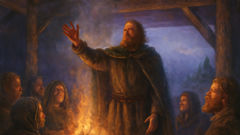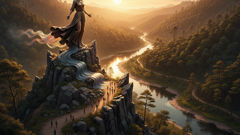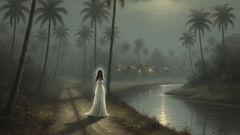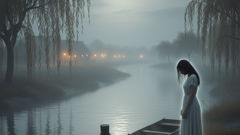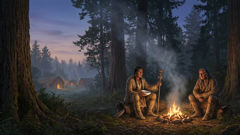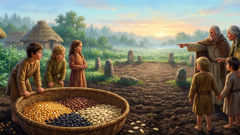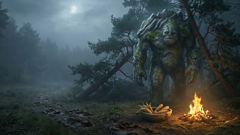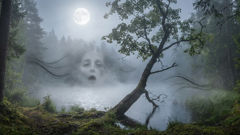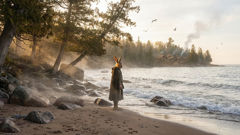Introduction
In the old north, where mountains thrust their icy crowns into the wind-torn sky and volcanic earth steamed with silent fury, the people of Iceland wove stories as surely as they wove their woolen cloaks. The darkness of the long winter pressed close, yet in firelit halls, voices rose, echoing tales older than memory—stories of gods and monsters, of fate and courage, of worlds perched upon the roots of the great ash Yggdrasil. These stories were not merely recited; they were sung, shaped by the skalds whose mastery of words was as vital as the mastery of the sword. Among all the tales, none held such power as those found in the Poetic Edda, a living collection passed from tongue to ear, from heart to heart. It was more than poetry; it was a map of the world’s soul. From Odin’s relentless quest for knowledge to the trials of mortal heroes, the Edda’s verses hummed with the pulse of ancient wisdom. In this land, the boundary between myth and reality was as thin as a veil of mist on a fjord. And so it was that, long after the first skald had sung his verse to the flicker of whale-oil lamps, new stories grew from those old roots. Some were true, some mere shadows. All were born from the same northern fire. This is the story of Eyvindur, a young skald whose fate was forever entwined with the lost runes of wisdom—a journey that would lead him beyond the known world, into the heart of myth itself. As the snow fell outside and the wind howled, the embers of the Edda glowed in his spirit, guiding his path through peril and wonder alike.
The Rune That Vanished
Eyvindur was born beneath the gaze of Snæfellsjökull, where legends said worlds converged and the old gods still whispered through the basalt stones. His mother called him a dreamer, while his father—once a skald himself—taught him the subtle art of memory and song. The world outside their turf-roofed home was wild and raw: glacial rivers coiled through mossy valleys, and the wind sang its own verse each night. But it was the stories that truly shaped him. From the first time Eyvindur listened to his father recite the verses of Völuspá—the seeress’s prophecy—he felt the words settle into his bones like ancient runes.
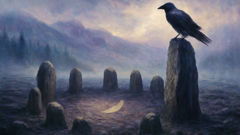
As he grew, so did his longing to touch the heart of the stories. He learned that some verses in the Poetic Edda were shrouded in riddles; that the greatest wisdom was always hidden. One winter, as storms battered the coast and the sea churned with secrets, Eyvindur sat by the fire, reading the old skin-bound scrolls. There he found a fragment that chilled him to his marrow: ‘The rune of remembrance, lost before men sang. Seek where silence falls deepest and wisdom is weighed in tears.’
The words haunted him. He asked his father, who shook his head, whispering that some runes were so powerful even Odin himself had wept to know them. Eyvindur’s nights grew restless. He dreamed of the World Tree stretching between realms, its roots tangled with serpents and its crown ablaze with stars. He saw himself climbing, searching for a rune carved not in wood or stone, but in silence itself.
One dawn, when the sun was nothing but a pale coin behind storm clouds, Eyvindur made up his mind. He would seek the lost rune, wherever it lay. Armed with little more than his father’s harp, a bundle of dried fish, and a cloak thick with years of use, he set out towards the heart of Iceland—where, legend held, the worlds were thinnest and wisdom waited for those who dared to seek. The land was harsh but beautiful: black lava fields rippled like frozen waves; steaming vents sent up pillars of mist, and everywhere the raw smell of earth and brine filled his lungs.
In the silence of the wild, Eyvindur began to compose his own verses. He sang to the rivers, asking them for stories. He recited stanzas to the wind, hoping for an answer. Days slipped into nights. His path led him to ancient cairns and mossy stones etched with runes so old the meaning had faded, but he pressed on. Finally, as he crossed a high pass veiled in fog, Eyvindur stumbled upon a circle of stones. In the center, the earth was bare except for a single white feather. As he bent to pick it up, a raven landed on the highest stone, its eyes glittering with a strange intelligence.
Eyvindur bowed, knowing the old tales: Odin’s ravens, Huginn and Muninn, were the bearers of thought and memory. The raven spoke—not in words, but in a language of images and longing. Eyvindur saw flashes: the shimmering Bifröst, the serpent coiled around the roots of Yggdrasil, the faces of gods and monsters. When the vision faded, he held the feather tightly. It pulsed with hidden meaning, the promise of a path forward, but also a warning—wisdom always comes with a price.
Into the Realms of Gods and Monsters
With the raven’s feather in hand, Eyvindur journeyed further than any mortal he’d ever known. The feather shimmered faintly at night, guiding him through tangled birch woods and steaming valleys. He sang verses from the Edda with every step—sometimes for courage, sometimes to keep loneliness at bay. As days blurred into weeks, Eyvindur reached a place where reality seemed to ripple: roots as thick as ship masts coiled above ground, and the air tasted of honey and thunder. He realized he’d come to a border—the seam between the world of men and the realms of gods.
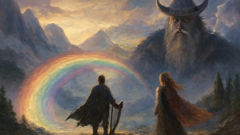
As he pressed onward, a golden light flickered between the trees. A figure waited by a still pool: a woman in a cloak of falcon feathers, her eyes sharp as ice. Eyvindur knew her from the old songs—Freyja, goddess of love and fate. She regarded him with a smile both warm and dangerous. ‘Why do you seek what was lost before words?’ she asked. Eyvindur bowed low, reciting his purpose in a voice that shook. Freyja listened, then offered him a choice: turn back with a song, or move forward and risk everything for wisdom.
He chose to continue, and Freyja led him to Bifröst—the rainbow bridge that arched impossibly into storm-lit clouds. Its colors pulsed with music. Eyvindur’s harp strings hummed in resonance as he crossed, each footstep echoing a new stanza in his heart. The bridge carried him to Asgard, land of gods. There he saw Odin himself—one-eyed, cloaked in midnight, flanked by his ravens. Odin’s gaze pierced him to the soul. He asked Eyvindur a riddle: ‘What is known to all, forgotten by many, yet shapes every fate?’
Eyvindur thought of the stories, the silences between words, and answered, ‘Memory.’ Odin nodded, pleased. The Allfather warned that wisdom is not given freely; every answer takes something in return. He granted Eyvindur a glimpse of Mímir’s well, where the waters shimmered with memory and sorrow. At its edge, Eyvindur saw visions: Yggdrasil’s roots trembling with prophecy, giants forging chains of fire, gods preparing for Ragnarök.
The price for such knowledge was steep. For each secret Eyvindur learned, a piece of his own past grew dimmer. He remembered less of home and family, more of ancient battles and cosmic tides. Yet he pressed on. In the halls of Asgard, he met Thor, who taught him courage; Frigg, who whispered truths about loss; and Loki, whose laughter twisted through the golden halls like a serpent’s coil.
But it was not enough to witness; Eyvindur needed to act. Loki led him astray into Jötunheimr, realm of giants, where frost and chaos reigned. There, Eyvindur faced challenges not of strength but of wit: outsmarting shapeshifters, solving riddles that threatened to freeze his soul. At each turn, he turned to the verses he carried inside—the poetry of survival, the power of words to shape reality. In the end, Loki revealed his true face—not only a trickster but a guardian of necessary change. Through this trial, Eyvindur learned that wisdom lies not in hoarding knowledge but in letting go when the time is right.
The Silence at the End of All Songs
Eyvindur’s final trial led him to the roots of Yggdrasil itself—a place where time seemed to melt and reform, where silence weighed heavier than stone. The feather, grown gray with journey and sorrow, pointed him toward a gaping hollow beneath the tree’s tangled roots. Shadows writhed there, and a bitter chill seeped from below. In his heart, Eyvindur knew this was Hel’s realm—the land of the dead.
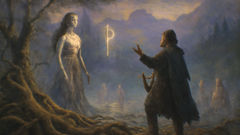
He hesitated, remembering tales of souls lost forever in Hel’s embrace. Yet the words of the Edda pressed him forward: ‘He who seeks wisdom must walk the shadow’s path.’ Down he climbed, harp in hand, the silence swallowing even his heartbeat. In the underworld, the air shimmered with memories not his own: mothers weeping for lost sons, warriors forgotten by song. In the distance, a woman waited—Hel herself, half-beautiful and half-corrupted by decay.
Hel spoke not with words but with presence, her gaze weighing every secret Eyvindur carried. She gestured to a river that ran silent and black as night. On its far bank, shadows of those who’d once sung filled the mist. To cross, Eyvindur had to let go of his last fear—the terror that his own story would vanish into nothingness. He tuned his harp, fingers trembling, and began to sing.
His voice rose in that darkness, weaving verses that honored loss and longing, joy and pain. He sang of every moment that mattered: his mother’s laughter, his father’s teachings, the cold wind on Snæfellsjökull’s slopes. The shadows grew still; Hel listened, her face softening as the song spun threads of light through the gloom.
At the song’s end, a single tear fell from Hel’s dark eye. She handed Eyvindur a rune—simple, stark, yet blazing with power. It was not a mark for memory or knowledge, but for silence—the kind that follows every song and allows new ones to grow. As Eyvindur took it, the world trembled. He rose from Hel’s realm lighter than before, his mind no longer burdened by forgotten memories but rich with the promise of new tales.
Emerging beneath Yggdrasil’s crown, Eyvindur found the world changed. The runes on ancient stones glowed anew; even the wind seemed filled with unspoken words. He realized now: the greatest wisdom is not in knowing everything, but in honoring the silence between stories—the space where possibility is born. He returned to his home in Iceland, where the darkness was no longer fearsome but rich with meaning. In firelit halls, he became a master skald, singing not only the old verses but those born from his own journey—reminding all who listened that wisdom is a song, and silence its truest note.
Conclusion
The story of Eyvindur echoes through Iceland’s valleys and highlands, as persistent as the northern winds. His journey—born from the ancient stanzas of the Poetic Edda—reminds us that myth is not something locked away in distant ages but a living force that shapes our present. The wisdom he gained was not merely the secrets of gods or riddles of fate, but an understanding of silence: that between every word, every verse, every heartbeat, there lies a moment where possibility dwells. In that silence, new stories take root. The Edda endures not because it holds every answer, but because it invites each new generation to ask their own questions, to sing their own songs, to listen for the rune that waits in the hush at the end of all things. So long as fires burn and voices rise in darkness, the spirit of the Edda—its poetry, its wisdom, its bold embrace of mystery—will never be lost.

